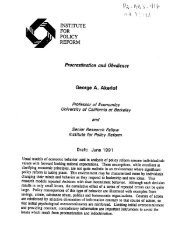I AR Pest control - USAid
I AR Pest control - USAid
I AR Pest control - USAid
Create successful ePaper yourself
Turn your PDF publications into a flip-book with our unique Google optimized e-Paper software.
the Philippine Government here in this<br />
country. The PL 480 Title IIprogram in the<br />
Philippines is targeted on the nutrition problems.<br />
It isnot a general program; it is a<br />
targeted program that is dealing as directly<br />
and as effectively as possible with the nutritional<br />
problems of this country. We do not<br />
really distinguish here in our programs between<br />
the nutrition problems of malnutrition<br />
and the availability of the Title II program.<br />
These things work hand and glove,<br />
and they are mutually reinforcing. I think<br />
that some of the experience that we have <br />
had in targetting these special resources <br />
will be of interest to all of you. <br />
Since we are living in a part of the world<br />
here in the Philippines that isprone to natural<br />
disasters repeatedly and particularly<br />
during the late summer and fall of the year,<br />
we likewise appreciate the great asset that<br />
the Title II commodities make available to<br />
us in times of emergency. Perhaps because<br />
of nature's conditions around us we have<br />
experimcrnted and had more work with the<br />
use of Title 11foods than other countries,<br />
and I hope that either in your formal sessions<br />
or informally you yoe fma r<br />
whe ovied aheres <br />
have provided us here. <br />
wthtails bhece f r <br />
Another element of the program that we<br />
attach significance to isthe use of these<br />
commodities in Food for Work. There are a<br />
great many organizations, private as well<br />
as public, that are able to use these commodities<br />
with particular effectiveness and<br />
bring the economic development involvement<br />
of communities into the process at<br />
the very low level. Here in the Philippines<br />
the word "Green Revolution" has a special<br />
meaning. In addition to the use of the term<br />
several years ago associating it with the new<br />
developments in high yielding grain varieties,<br />
this term has been adopted in the<br />
Philippines to symbolize a national concern<br />
with the feeding of the poorer people, particularly<br />
children throughout the country.<br />
There are many programs of community,<br />
school and backyard gardening which are<br />
very much related to the topic of the seminar<br />
today.<br />
I have a pet peeve that I want to table<br />
because this may be the only opportunity I<br />
have to do that. Bert Fraleigh and our own<br />
fine staff of FFP officers, both Filipino and<br />
American, are very much aware that the<br />
program can be improved, but we have not<br />
been able to identify all the ways and means<br />
that this might be accomplished. I'm frustrated,<br />
and frustrated in good part because<br />
of the nagging of my wife and people who<br />
talk to her about stories that the bagging and<br />
handling of Title II commodities leaves<br />
something to be desired. It's one thing to<br />
receive these commodities in good shape<br />
off the ships unloaded here in the port of<br />
Manila; it's quite another thing weeks er<br />
months after their arrival for these commodities<br />
to be in a condition fit for human consumption<br />
in the thousands of locations<br />
throughout the Philippine Islands. It isa<br />
major problem related to storage; it isa<br />
problem related to handling, and it isa<br />
problem related to perhaps the bagging and<br />
the knowledge of the law and of the circumtan<br />
ea pve a an wheom<br />
product when the bag isopened and the<br />
food prepared for consumption. I hear<br />
through the years all too many complaints<br />
that it isgreat that these food items can be<br />
made available, and it isgreat that they've<br />
been managed in such a way that they do,<br />
in fact, get out to thousands of schools<br />
and feeding centers Iccated throughout<br />
the country. But it also must be pointed out<br />
that some of this food has to be sifted,<br />
and weevils and other infestatiors remain<br />
aproblem. So this morning I would like to<br />
challenge this group to think long and<br />
hard as to whether or not the whole system<br />
isproviding you with the very best quality<br />
in the way that it is most palatable at the<br />
end of the road.<br />
I want to say another word about the coordination<br />
of the Title 11program here in the<br />
Philippines. it may be that we in the Philip<br />
pines are blessed with a little more favorable<br />
situation than some of you in your<br />
countries. The great satisfaction to us is<br />
that here in the Philippines and in our own<br />
USAID mission we have a very competent<br />
staff of Philippine officers. We have both<br />
Filipino professional people and several<br />
Americans working full-time on this program<br />
and we could not achieve the full<br />
success of this program without these<br />
8

















